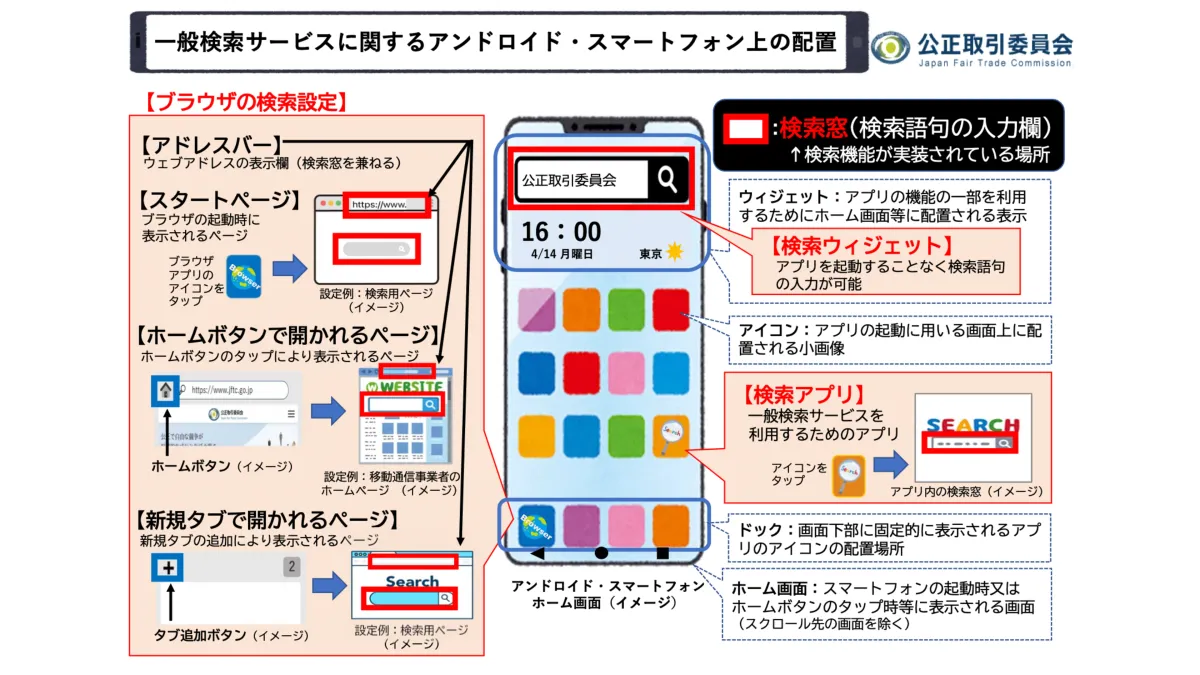
The Japan Fair Trade Commission (JFTC) issued a cease-and-desist order against Google LLC on April 15, 2025, marking the first such action against a major digital platform company in Japan. The order addresses practices that allegedly violated Japan's Antimonopoly Act by restricting competition in smartphone search services.
JFTC finds Google's contracts with phone makers restricted competition
According to the JFTC, Google imposed restrictive conditions on Android smartphone manufacturers through two types of contracts that effectively blocked rival search engines from being installed on devices. The investigation, which began in October 2023, concluded that these practices constituted unfair trade methods under Japanese law.
The JFTC's investigation revealed that Google required smartphone manufacturers to preinstall Google Search and Chrome browser apps in prominent positions on home screens as a condition for accessing the Google Play store. Additionally, the company shared portions of its search advertising revenue with manufacturers and mobile carriers—but only if they agreed not to install competing search services.
"Google LLC has, since at least July 2020, been preventing the implementation of search functions from other general search service providers on specific Android smartphones," the JFTC stated in its order.
The regulator found that Google's contracts covered approximately 80% of Android smartphones sold in Japan as of December 2023. Six smartphone manufacturers had Mobile Application Distribution Agreements (MADA) with Google, while four manufacturers and one mobile carrier had Revenue Sharing Agreements (RSA).
Contract conditions restricted manufacturer choices
The JFTC specifically identified two contractual mechanisms that Google used to maintain its dominant position:
First, through its Mobile Application Distribution Agreement (MADA), Google required manufacturers who wanted to preinstall the Google Play app store to also:
- Preinstall Google Search app and place its widget and icon on the initial home screen
- Preinstall Google Chrome browser, place its icon on the initial home screen, and maintain Google as the default search engine
Second, through Revenue Sharing Agreements (RSA), Google offered to share search advertising revenue with manufacturers and carriers, but only if they agreed to conditions including:
- Not implementing search functions from other search providers
- Not installing features primarily designed to connect to other search services
- Not promoting other search services to users
- Using Google as the search service for all search functions
- Setting Google Chrome as the default browser and placing its icon in the dock
- Not changing Chrome's default search settings from Google
- Setting all browser search settings to use Google's search service
Five-year monitoring and compliance requirements
The cease-and-desist order requires Google to:
- Discontinue the restrictive practices in both types of contracts
- Pass a resolution through its decision-making body to terminate these practices
- Notify affected smartphone manufacturers and mobile carriers of the changes
- Establish compliance guidelines related to the Antimonopoly Act for transactions with smartphone manufacturers
- Provide regular training and conduct periodic audits related to compliance
- Appoint an independent third party to monitor compliance for five years
- Submit reports to the JFTC on the implementation of these measures
The JFTC did not impose a financial penalty on Google. The case was pursued under unfair trade practice rules, which do not permit administrative penalties. The regulator could have sought monetary sanctions under private monopolization provisions, but chose not to pursue that route.
First major action against a digital platform company
This marks the first time Japan has issued a cease-and-desist order against one of the major digital platform companies. The action comes amid growing global scrutiny of large technology firms and their business practices.
"This order addresses practices that have made it difficult for competing search providers to have their services implemented on Android smartphones in Japan," a JFTC spokesperson said.
Google expressed disappointment with the decision. "We believe our agreements with manufacturers provide flexibility and choice while helping to keep Android free for everyone," a company representative stated. "We will carefully review the order before determining next steps."
If Google fails to comply with the order, it could face additional penalties. The company has not yet indicated whether it plans to appeal the decision.
Implications for digital markets
The JFTC's action follows similar cases in other jurisdictions targeting Google's business practices. The case represents Japan's most significant regulatory action to date in the digital platform space and signals the country's willingness to address competition concerns in digital markets.
Industry analysts note that the order primarily focuses on stopping future anticompetitive behavior rather than penalizing past actions. By targeting the revenue-sharing agreements specifically, the JFTC has addressed what some consider the most effective mechanism for maintaining Google's dominance in mobile search.
"Revenue sharing agreements created a powerful financial incentive for manufacturers to exclusively feature Google's search services," said Hiroshi Tanaka, a competition law expert at Tokyo University. "Removing these exclusive arrangements could potentially open the door for more competition in Japan's mobile search market."
The order requires Google to implement changes promptly, with monitoring set to continue for five years to ensure compliance.
Timeline
- October 23, 2023: JFTC announces investigation into Google's practices
- December 2023: Investigation confirms agreements with six manufacturers covering 80% of Android phones in Japan
- July 2023: Investigation confirms revenue-sharing agreements with four manufacturers and one mobile carrier
- April 15, 2025: JFTC issues cease-and-desist order against Google
- Next steps: Google must implement required changes and appoint an independent monitor approved by JFTC

